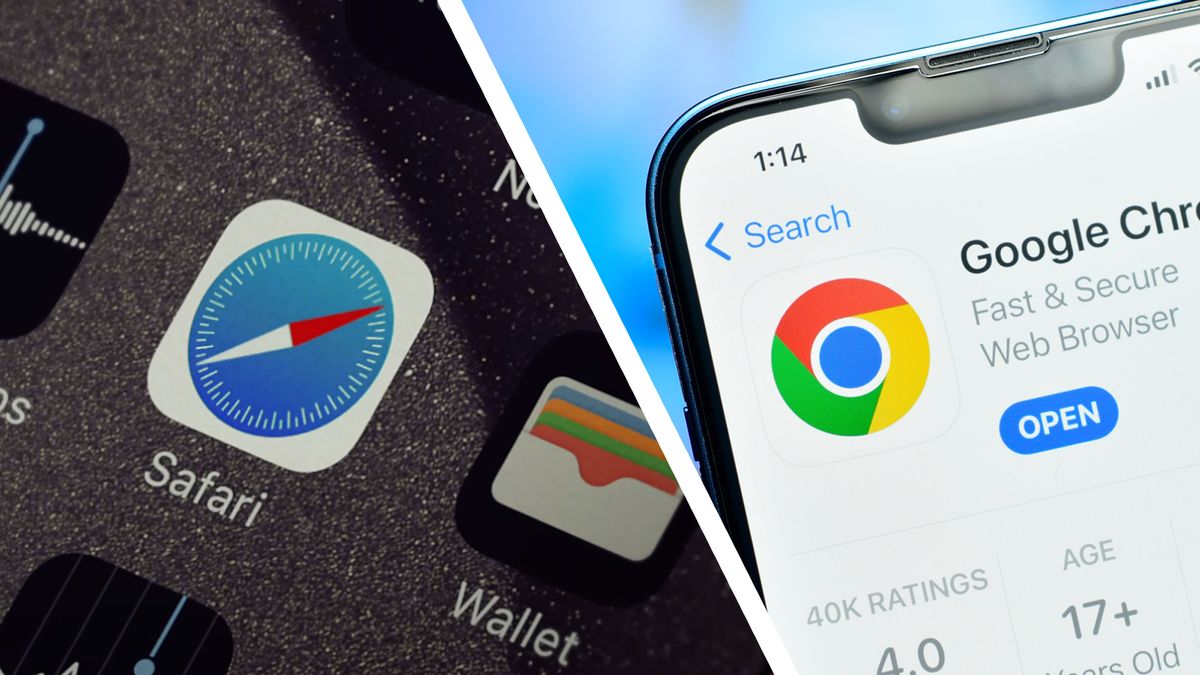This week, Apple adopted some interesting tactics to convince iPhone owners that they should be using Safari on iOS – including scaring them with a new, Black Mirror-esque video ad.The ‘Privacy on iPhone’ video shows people using unnamed web browsers surrounded by flying security cameras that watch their every scroll. ‘Your browsing is being watched,’ it warns in an unsubtle poke at Google Chrome.Apple has previously called Android a ‘massive tracking device’ in an internal presentation that surfaced during a Google antitrust
This week, Apple released a new ad (above) with the tagline ‘Your browsing is being watched.’ The video shows scenes of flying security cameras and, later, robot bats snooping on oblivious people as they casually browse the web on their phones.The scenes become increasingly sinister, with one man throwing his phone overboard from a boat and a flock of security cameras descending on a woman. Fortunately, she knows how to instantly destroy the cameras – by tapping Safari on her iPhone. The ad ends with the line ‘Safari. A browser that’s actually private.’ There’s no explicit mention of Google Chrome in the ad, but it’s clear what Apple is referring to – Chrome currently has a 67% share of mobile browsers, compared to 23% for Safari (according to StatCounter).Get daily insight, inspiration and deals in your inboxSign up for breaking news, reviews, opinion, top tech deals, and more.Contact me with news and offers from other Future brandsReceive email from us on behalf of our trusted partners or sponsorsBy submitting your information you agree to the Terms & Conditions and Privacy Policy and are aged 16 or over.(Image credit: Apple)While Chrome is the world’s most popular browser, it isn’t without its critics. The two main criticisms are its default use of tracking cookies and its seemingly limited Incognito mode. Apple goes pretty hard on the latter in an accompanying WebKit blog post for its new ad. That post states that ‘Apple believes that users should not be tracked across the web without their knowledge or their consent. Entering Private Browsing is a strong signal that the user wants the best possible protection against privacy invasions, while still being able to enjoy and utilize the web. Staying with the 2005 definition of private mode as only being ephemeral, such as Chrome’s Incognito Mode, simply doesn’t cut it anymore. Users expect and deserve more.’So, does Apple have a point? And what does this all mean when it comes to choosing the best web browser for your iPhone?The reality: Safari is more privacy-focused than Chrome, but that’s not the whole storyIn general, Safari on iOS places a greater emphasis on privacy than Chrome. But it also can’t completely stop third parties from collecting your data, and mobile web browsers are also in a state of flux, which explains the timing of this Apple ad.It’s helpful to understand that backstory. Until this year, iOS web browsers have been less differentiated than their desktop equivalents, because Apple forced them all – even Chrome – to be built on WebKit, which is the browser engine used by Safari.However, the EU’s recent Digital Markets Act (DMA) means that, at least in that region, Apple has been strong-armed into allowing third-party web browsers to use other engines, like Blink. In theory, this means that we could soon start to see browsers like Chrome offer something closer to their full desktop experience on iPhones – which could change the picture and also convince some Safari users to switch.(Image credit: Future / Apple)That’s not all. The DMA’s requirements also meant that, from iOS 17.4, iPhone users started seeing a choice screen when they opened Safari for the first time, letting them pick their default browser from a list. This is another threat to Safari’s dominance on the iPhone, with some smaller browsers like Brave reporting a big spike in downloads when that feature was rolled out in March.This all helps to explain the timing of Apple’s ad. But does Apple still have a point about privacy in Safari? Overall, Apple’s browser does have more robust privacy features turned on by default than Chrome. Since 2017, Apple has made Intelligent Tracking Prevention (ITP) a staple of Safari and WebKit, which means that the feature’s cross-site tracking restrictions have also affected the iOS version of Chrome (which is, for now, built on WebKit).(Image credit: Future / Apple)While it’s possible to boost your privacy on Chrome, some of its features – like Incognito mode – also aren’t necessarily as powerful as their Safari equivalents. For example, Google was forced to admit in a class-action lawsuit in 2020 that your data is still collected in Incognito mode. Safari’s private browsing mode (tap the two squares in the bottom-right corner, then swipe across to ‘Private’) also isolates your browsing across different tabs, whereas Chrome adds every tab to the same session – which means you need to close every Incognito tab to keep your data private.How to boost your privacyIt’s possible to boost your privacy in both Safari and Chrome by tweaking your settings. To do this, head to Apple’s guide to browsing privately in Safari on iOS – if you want to stick to Chrome, go to Google’s guide to managing Chrome safety and security or its steps for browsing in Incognito mode. Safari’s Private Browsing mode is also stronger in other areas. Extensions with website access are now turned off by default, and ‘search suggestions’ are only generated on-device. You can also turn on ‘Locked Private Browsing’ by going to Settings Privacy & Security


